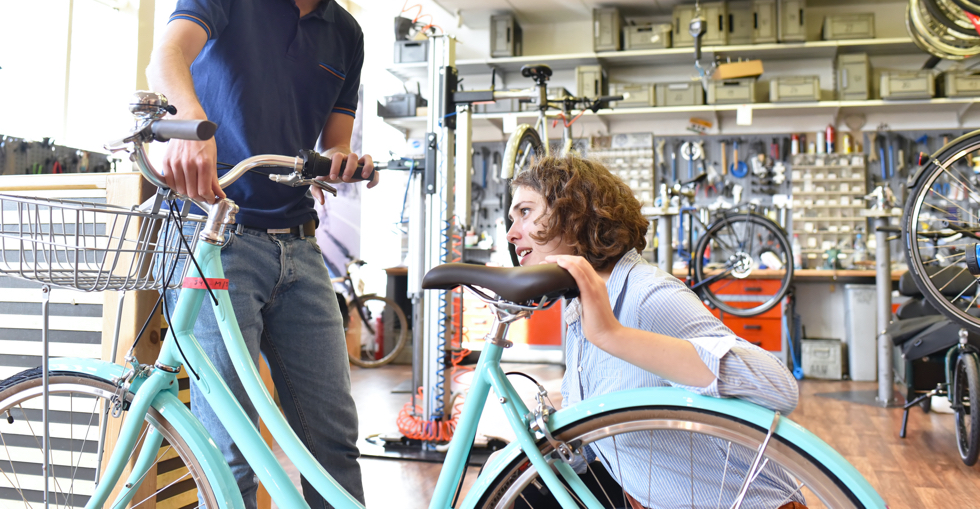When it comes to selling your bike shop, success can be judged by the price you achieve and how long it takes to find a buyer – if you find a buyer at all.
The master variable here is preparation – which starts long before you even put the business on the market.
Preparation for selling a bike shop
You will need to get your paperwork in order for a start, including tax records, payroll information, historic turnover and profit figures, profit forecasts, asset valuations, details of liabilities and debt, and leases and contracts.

A few things you can do to get your business ready to impress buyers before putting it on the market:
- Cleaning and tidying your premises
- Reviewing and optimising business processes – for instance, updating invoicing and credit control processes or upgrading point-of-sale systems
- Checking employment contracts, supplier terms and conditions, and customer and legal contracts for any issues that could complicate a sale
- Keeping staff morale high, whether through incentives, training or – at least for a while – keeping the sale confidential. In this sector, buyers particularly prize friendly and knowledgeable staff
Valuing a bike shop
Despite the high street’s travails, bike shops are prospering amid a boom in sales of bicycles, which are impractical to sell online. As such, the multiple applied to profits by valuation experts can be reasonably high. Sales volumes are the key driver, with bikes being high-value items that sell in low volumes and accessories – lights, locks and so on – being the reverse.

Footfall is another major factor in retail, so busy high streets or shopping centres are obviously prized. However, a high footfall location means higher rents and rates, which might price out some buyers. As with any retailer, the condition and – especially with bikes taking up a lot of space – the size of the premises are significant factors.
With bikes costing hundreds or thousands of pounds, stock value will no doubt add a considerable sum to your asking price too. Your digital presence – both your website and social media output – is also a significant valuation driver, with an ecommerce operation a major value add.
Getting a valuation for your business will be something that is best calculated by an experienced professional. It can also be worth getting a second opinion. Get advice from a broker, a lawyer or an accountant that has a track record of valuing businesses such as yours.
Finding buyers for your bike shop
Few business owners would try to sell up nowadays without attempting to sell a business online.
It’s comparatively cheap – low overheads and a global customer base mean listings websites can afford to set low prices – and you have access to buyers around the country and globally. No other method has such reach.

Nevertheless, don’t rule out other avenues, such as employees who work in your bike shop, local competitors, or a broker, who might have contacts who fit the buyer profile for a bike shop like yours.
A business broker can help you navigate the selling process and maximise your chances of success. Providing you find the right adviser – ideally someone with experience of selling small retailers – you can more than recoup your fees through a high sale price.
Negotiations
When you’ve been approached by a serious buyer and you’re satisfied with their financial wherewithal to proceed, the next step is negotiating a price and preliminary terms.
These ‘heads of terms’ are non-binding, and as such are subject to renegotiation before the final  agreement is signed. Buyers typically exercise their right to change the terms if due diligence – an exhaustive examination of every aspect of the business – uncovers problems they were hitherto unaware of.
agreement is signed. Buyers typically exercise their right to change the terms if due diligence – an exhaustive examination of every aspect of the business – uncovers problems they were hitherto unaware of.
For instance, your most charismatic staff member, who sells the most bikes of any employee, could leave during negotiations. Or the buyer’s valuation of your stock could be miles apart from yours.
If they feel you’ve been dishonest or difficult during negotiations, or stubborn on the price when they have a legitimate case for renegotiation, they could even walk away. It’s therefore wise to be as transparent (within reason) and reliable as possible during the sales process.
Closing the deal
If you can agree on a price, then it’s time to sign the final business sale agreement, a legally enforceable contract that obliges money and ownership of the business to change hands in the manner agreed.
That’s just a brief overview of the process as it might apply to bike retail, but whether you’re selling a bike shop or a furniture store, the fundamentals of selling a business are fairly consistent regardless of sector.
But again, no amount of reading is a substitute for getting advice from a competent, appropriately experienced solicitor and/or broker.

